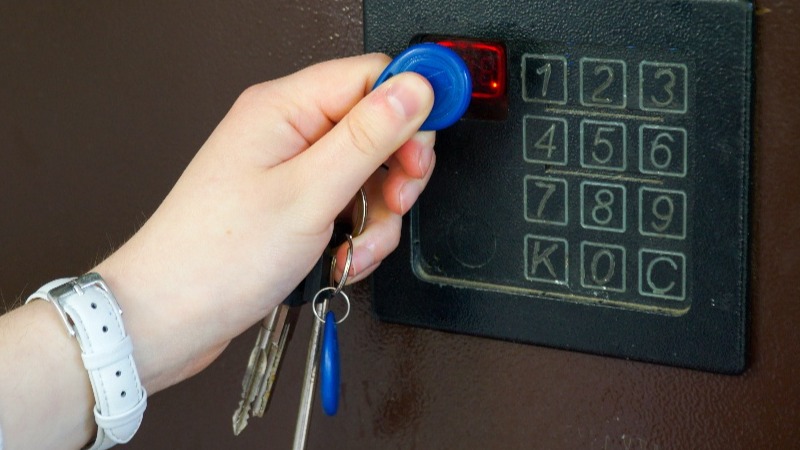Adding Security Access to a Building
by Stephen Cieslukowski, President | Sep 22, 2022 | Security System | 0 comments

Access Control Systems protect people, property, and data against threats posed by unauthorized intruders. These systems are vital in securing your organization’s assets, both in the physical and digital environments.
The days of lock and key systems are long gone. Today, access control goes hand in hand with cybersecurity. Without proper access monitoring , you leave your business vulnerable to data loss, breach of privacy,theft and you have no control of who is entering your building and when.
The best access control systems allow you to secure your facilities, controlling which users can go where and when. But how do you choose the best access control system for your business?
Here's your complete guide to security access cards.
What are Key Cards and Key Fob Systems?
Security access cards and FOBs, a small security hardware device with built-in authentication used to control and secure access to buildings, have been around for a few decades now. You’ve probably seen or used these key cards before – in hotels, parking garages, HOA communities with communal amenity spaces, or at your office.
A security access card is essentially a key card or a key fob used to unlock electrically powered doors. Key card entry systems have to be tapped or swiped through a reader to authenticate a user’s credentials. Key fobs, on the other hand, use proximity technology, meaning they don’t have to be inserted into the reader to be identified.
Key card and fob systems are convenient and help to keep unwanted individuals out. They can also be configured to allow specific users or groups of people certain levels of privileges and access. Because most of these systems are cloud-based, their access control settings can be easily managed and updated as necessary. It’s also easier to keep digital audit trails.
How Do Key Card Entry Systems Work?
Most security card systems use RFID (radio frequency identification) and wireless technology to communicate with the reader via a small transmitter whenever a user is within range.
As the name suggests, swipe systems require security cards to be swiped across or into readers to gain access to an area. Swipe cards are often a cheaper alternative to RFID systems, but they do lack the convenience of proximity key cards. They're also susceptible to physical wear, tear and abuse and require replacement periodically.
Some swipe cards use Wiegand technology – the same technology frequently used to encode bank card and credit card numbers. It consists of a wired interface between a card reader and encoded data. The Wiegand effect is incredibly difficult to counterfeit, allowing for increased commercial security.
Door card reader systems can also be customized to support mobile unlocks with a smartphone app. Credentials are stored in the form of a QR code. However, because QR codes can be easily shared and/or duplicated, they should be used sparingly and updated often.
Explore Cloud-Based Access Control and Security Systems
A problem can arise when you need to extend building entry management systems to cover offices in multiple sites. For this, you need a centralized system that periodically synchronizes access rights between the systems at each site.
With cloud-based access control, you can manage and update one security card or your entire system in real-time. A centralized access control dashboard makes it easier to manage your entire organization’s security. In case of a lost or stolen key card, you can simply revoke access from the control panel. You can also increase a user’s clearance in an instant.
Can’t decide which security access cards are right for you? The security experts at Brothers Fire and Security are here to help.
Recent Posts
- Hidden Risks: Why Aging Fire Systems Need More Than Just Annual Inspections
- Strategic Security Camera Placement: Maximizing Protection Through Integration
- Why NFPA 72 Makes Integrated Fire & Security Monitoring Systems Essential
- Benefits of a Building Access Control System
- Ultimate Guide to Fire Extinguishers: Testing, Inspections, Maintenance

